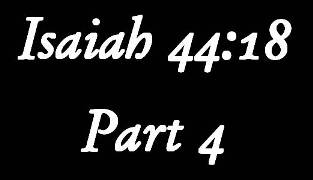 Who is the grand “HE” in Isaiah 44:18.[1] Of Idol makers and Idol worshipers, Isaiah says, “They do not know; they do not understand because he plastered over their eyes so they cannot see, their hearts so they cannot understand.”
Who is the grand “HE” in Isaiah 44:18.[1] Of Idol makers and Idol worshipers, Isaiah says, “They do not know; they do not understand because he plastered over their eyes so they cannot see, their hearts so they cannot understand.”
Calvinists usually identify the “HE” as YHWH/God, and Arminianists imagine that “HE” is the deceived heart of the worshiper (there is no IT in Hebrew), and Spiritual Warfare aficionados bask in the possibilities of “HE” as the idol or god.” While each is both grammatically and theologically possible, we need to glean our answers from the text as much as possible, broadening out as necessary to find meaningful clues.
Today, I’d like to consider the suggestion that it is God who has plastered over the eyes of the idolater.
The Geneva Bible even translates the verse this way, saying, “They haue not knowen, nor vnderstand: for God hath shut their eyes that they cannot see, and their heartes, that they cannot vnderstand.”
I’m not one to quote Albert Barnes but, here, he promotes two angles at once. He openly declares God to be the antecedent of “He plastered their eyes,” while simultaneously promoting a passive or middle rendering. God did it, he says, only to the extent that nothing happens without his permission. This is cheating, I think. He ignores the vitality of the choice on the basis of a Greek reading that is part of a larger and decidedly theological stand in terms of the Divine and human role in Israel’s blinding. We must choose (God, Human Heart or Idol/god) and sweeping the issue away with a passive or middle cheats the would-be interpreter and ignores an ancient theological tension.
Isaiah 44:18 does not stand alone like a signal pole atop a hill, but is part of a larger narrative in Isaiah in which God is at work in Israel to seal the bulk of the nation in their idolatrous path and to redeem a remnant from among them who, for one reason or another, may yet see and hear. The discussion is rooted in the very call of the prophet. There is no ambiguous pronoun here, but, rather, a clear declaration of Divine sovereignty at work to seal idolaters in their sin.
Isaiah 6:9-10 (AST)[2] And He said, “Go and say to this people, ‘Continue to listen, but do not understand. Continue to see, but do not perceive.’ Make fat the heart of this people, and his ears make heavy, and his eyes paste shut, lest he see with his eyes, and with his ears he hear, and with his heart he understand and return and it heal him.”
Compare the Qumran Scroll of Isaiah with this. The Qumran community, who saw all texts as predictions of their own situation, the hardening of Israel was unacceptable. With a few flicks of the pen shifting a few letters they turned a divine hardening of Israel into a call to vigilance. It reads:
“And he said, “Go! And tell this people, ‘Keep on listening because you might understand. Keep on looking because you might perceive.’ Make the heart of this people appalled at evil, deafen their ears, paste shut their eyes, lest they see evil with their eyes, and hear of bloodshed with their ears. Let their heart understand and let them repent and be healed.””
Compare also the Greek (LXX), which, in Isaiah 44:18, Barnes mistakenly took for translation rather than theological adjustment. The Greek text in Isaiah 6:9-10 eradicates the entire idea that God is at work in this process of blinding, deafening and hardening, placing full responsibility on human choice.
And He said, “Go and say to this people, ‘You will listen intently, but will not understand, and you will look intently, but will not perceive.’ For the heart of this people has been made fat, and with their ears they scarcely hear, and their eyes they have shut, lest they should see with their eyes, and with their ears they should hear, and with their hearts they should understand and turn and I heal them.”
The idea does not begin with Isaiah, however. The notion of Israel being described in terms of their idols is found between Deuteronomy 4:28, “the work of human hands, that neither see, nor hear, nor eat, nor smell,” and Deuteronomy 29:4, which is, according to some, the actual source for Isaiah 6:9-10… “But to this day the LORD has not given you a heart to understand or eyes to see or ears to hear.”
There is every reason to feel good about seeing God as the antecedent of “He has plastered over their eyes,” for this has been his work among his people in response to their apostasy through idol worship from the beginning.
[1] “Why is It So Hard to Translate Isaiah 44:18,” “God, Idols, and the Human Heart in Isaiah 44:18,” & “Becoming Like Our Idols in Isaiah 44:18.”
[2] i.e. The Andrew Sargent Translation
Discover more from Biblical Literacy with Dr. Andrew D. Sargent
Subscribe to get the latest posts sent to your email.


